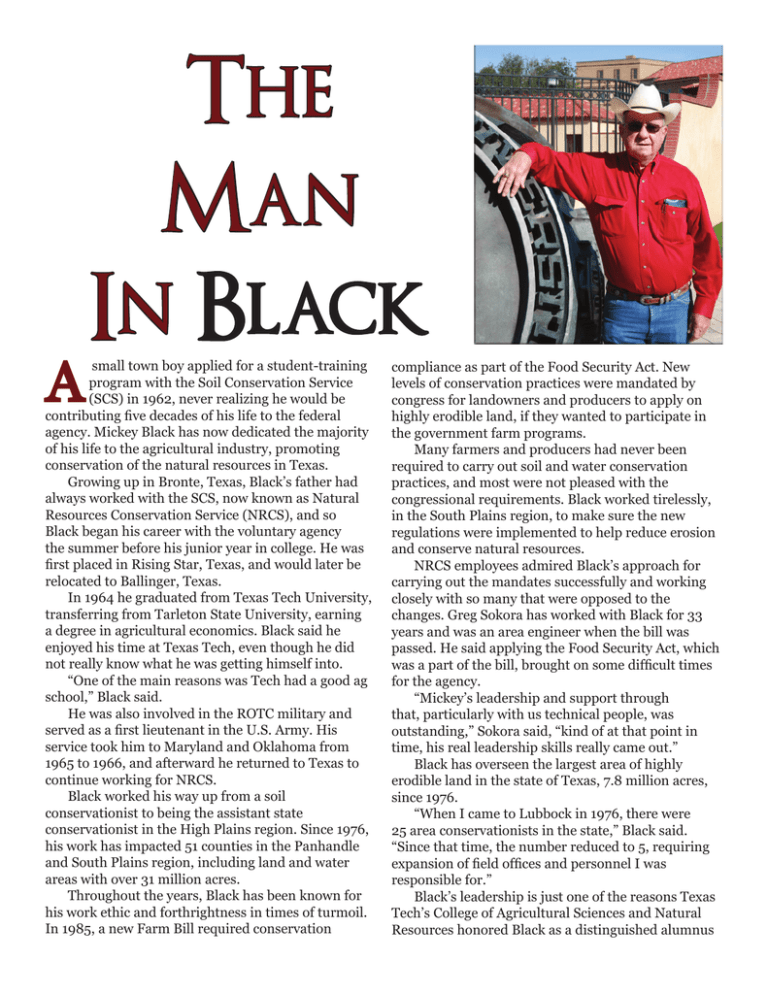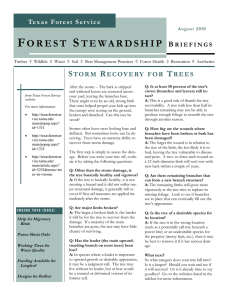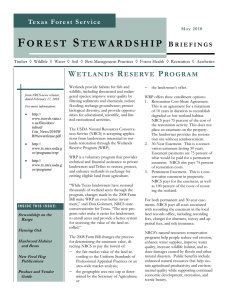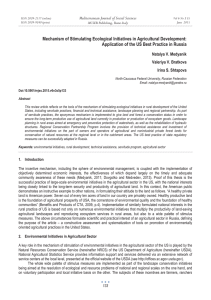The Man In Black
advertisement

A The Man In Black small town boy applied for a student-training program with the Soil Conservation Service (SCS) in 1962, never realizing he would be contributing five decades of his life to the federal agency. Mickey Black has now dedicated the majority of his life to the agricultural industry, promoting conservation of the natural resources in Texas. Growing up in Bronte, Texas, Black’s father had always worked with the SCS, now known as Natural Resources Conservation Service (NRCS), and so Black began his career with the voluntary agency the summer before his junior year in college. He was first placed in Rising Star, Texas, and would later be relocated to Ballinger, Texas. In 1964 he graduated from Texas Tech University, transferring from Tarleton State University, earning a degree in agricultural economics. Black said he enjoyed his time at Texas Tech, even though he did not really know what he was getting himself into. “One of the main reasons was Tech had a good ag school,” Black said. He was also involved in the ROTC military and served as a first lieutenant in the U.S. Army. His service took him to Maryland and Oklahoma from 1965 to 1966, and afterward he returned to Texas to continue working for NRCS. Black worked his way up from a soil conservationist to being the assistant state conservationist in the High Plains region. Since 1976, his work has impacted 51 counties in the Panhandle and South Plains region, including land and water areas with over 31 million acres. Throughout the years, Black has been known for his work ethic and forthrightness in times of turmoil. In 1985, a new Farm Bill required conservation compliance as part of the Food Security Act. New levels of conservation practices were mandated by congress for landowners and producers to apply on highly erodible land, if they wanted to participate in the government farm programs. Many farmers and producers had never been required to carry out soil and water conservation practices, and most were not pleased with the congressional requirements. Black worked tirelessly, in the South Plains region, to make sure the new regulations were implemented to help reduce erosion and conserve natural resources. NRCS employees admired Black’s approach for carrying out the mandates successfully and working closely with so many that were opposed to the changes. Greg Sokora has worked with Black for 33 years and was an area engineer when the bill was passed. He said applying the Food Security Act, which was a part of the bill, brought on some difficult times for the agency. “Mickey’s leadership and support through that, particularly with us technical people, was outstanding,” Sokora said, “kind of at that point in time, his real leadership skills really came out.” Black has overseen the largest area of highly erodible land in the state of Texas, 7.8 million acres, since 1976. “When I came to Lubbock in 1976, there were 25 area conservationists in the state,” Black said. “Since that time, the number reduced to 5, requiring expansion of field offices and personnel I was responsible for.” Black’s leadership is just one of the reasons Texas Tech’s College of Agricultural Sciences and Natural Resources honored Black as a distinguished alumnus in 2003. “For a country boy, who grew up in a rural area, it was an honor,” Black said proudly, showing his loyal red raider side. Black has also seen many changes over his 50 years at NRCS. When he started working for the agency, there were over 1,000 employees across Texas. Today, there are around 700 employees covering the entire state. “I’ve seen things come in full circle,” Black said. “The main thing that I’ve seen change, I guess, has been brought about by improved technology and the way we carry out our business that we do.” As conservation practices have changed over the years, Black has worked to develop the Resource Data and Concerns booklet for NRCS, as a resource guide to the agency’s employees in the high plains and south plains region. Not only is the book an informational guide internally, it is referred to by other employees all across the state. Black will be retiring with 50 years of experience under his belt and has made many lifelong friends. His retirement brings sadness to those who have had the chance to work with him, as his wealth of knowledge will be hard to replace. Retirement brings a time of reflection for Black. He said he will miss the camaraderie among his partners and also promoting soil and water conservation. “I hope to see the NRCS continue providing the services we’ve been able to provide farmers and ranchers,” Black said, “and also to provide them information pertaining to new technologies and the ways of doing things.” He has felt the most rewarding part of his job has been teaching the younger generations how to communicate with farmers and ranchers and also what to expect in an agricultural career. “The main thing is pursue what you would enjoy doing,” Black said. “The bottom line is, no matter what kind of job it is, if you don’t enjoy it, you’re not going to succeed in it.” Conservation is who Black is, and as he leaves NRCS, he will continue to maintain strong conservation ethics and practices, as a producer on his own land in the small town he grew up in. “The main thing is pursue what you would enjoy doing.” Photo Courtesy NRCS Photo Courtesy NRCS Photo Courtesy Marsha Black





